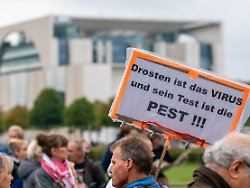Thursday October 14, 2021
“I hope you will die”
Incitement against corona experts continues to increase
In order not to be recognized, Christian Drosten usually only leaves the house wearing a hat and sunglasses. The pandemic has shown: Anyone who is in the spotlight as an expert and expresses an opinion often harvests hatred and criticism. A new survey highlights the extent.
Doctors and virologists in front of the camera and epidemiologists who comment on studies on Twitter: This has become commonplace in the pandemic. Experts take a stand on questions about Corona. A survey by the specialist journal “Nature” among more than 300 scientists from several countries now highlights the often negative reactions that some of them have experienced because of their public presence. It’s not just about hate messages, it’s also about death threats and, less often, physical attacks.
321 experts involved
First of all: It is not a scientifically supported, representative survey. The extent of the problem cannot be measured exactly with this. The journal “Nature” sent questionnaires to experts and worked in several countries with institutions that, among other things, send scientists’ statements to the media (Science Media Centers). 321 experts who spoke to the media about the pandemic took part. Most of them came from the UK, Germany and the USA. A good half of the respondents stated that they had sometimes, usually or always experienced troll comments or personal attacks after appearing in the media.
The negative consequences of the media presence extended to death threats in 47 cases, six scientists said they had been physically attacked. Some also report aggressive emails, hacked accounts or websites and complaints to the employer. In a “Nature” article with case studies, irritant issues become clear: The Australian epidemiologist Gideon Meyerowitz-Katz, for example, mentioned – expected – vaccinations. Surprisingly, he received most of the threats from people who defended the anti-worming drug ivermectin as an alleged preparation against Covid-19. “People email me anonymously from strange accounts” I hope you die “or” If you were around me, I would shoot you “”, Meyerowitz-Katz is quoted as saying. The question of the origin of the virus is also a hot topic, according to the report.
Need for action in media and politics
Experts fear that messages of hatred could lead to withdrawal and self-censorship by experts and deter their colleagues from appearing in public themselves. In the survey, those affected by personal attacks and troll comments were particularly likely to say that this had an enormous influence on their willingness to talk to the media. According to communication experts, this is not a new phenomenon. “However, the pandemic acted like a double burning glass. All the dynamics that we had already described in the research now came to light in high concentration and lightning speed,” explained Konstanze Marx from the University of Greifswald. She sees a need for action in the “general climate of discourse”, including in the media and politics. What is needed is a climate of science friendliness.
The “Nature” survey was anonymous, but there are known victims in Germany who themselves made massive hostility public some time ago. In addition to the SPD health expert Karl Lauterbach, this includes the virologist Christian Drosten. According to the police, unknown persons had also thrown incendiary devices at a building of the Robert Koch Institute in Berlin in October 2020. Charité scientist Drosten reported about a year ago at a congress in Berlin which downsides the notoriety has in everyday life: Since he is “quite uncomfortable” to be stared at while shopping, he goes out with sunglasses and a hat not to be recognized. Regarding how he dealt with hatred, Drosten said at the time: “All I can do is to exclude it as much as possible.”
One consolation remains, as the survey shows: When asked about positive experiences after media appearances, 83 percent agreed with the statement that they could have brought their message to the public.
